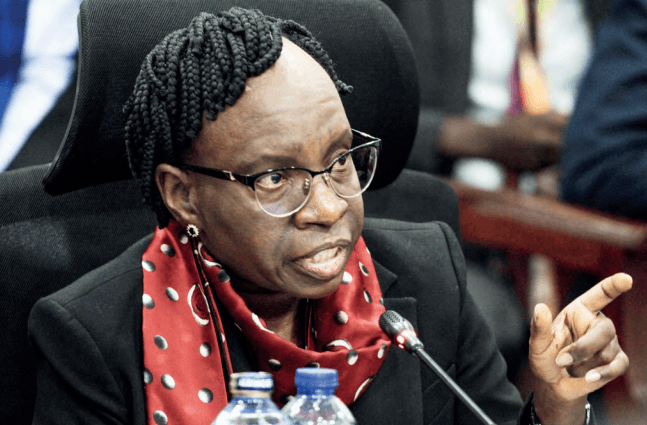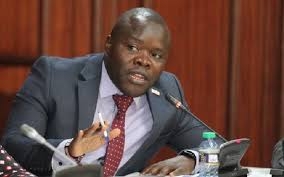The Salaries and Remuneration Commission on Wednesday bowed to public pressure squashing the entire Sh22 billion salary increment for all civil servants.
SRC chairperson Lyn Mengich said the decision has been necessitated by the prevailing financial constraints in the country.
The salary increment was to take effect this month.
“In view of the emerging fiscal constraints and the proposed budget cuts, and existing contractual commitments, and in further consultation with stakeholders, including and the National Treasury, SRC has reviewed the setting and advice of pay for the second phase of the implementation – 2021-25,” Mengich said.
“Therefore, in consultation with the National Treasury, SRC hereby freezes the upward review of salaries for all state officers, and will review the advice for all other public officers, taking into account the current realities of the economy, and a reduced budget to ensure affordability and fiscal sustainability of the wage bill.”
According to the commission, state officers, including MPs, account for Sh860 million of the Sh22 billion increment.
The rest was to cater to other cadres in the public service.
The move comes as a huge relief to overburdened taxpayers, who were to shoulder the ever-ballooning wage bill.
The move to award MPs and other state officers a pay increase triggered major storm at a time the country is stemming out of an anti-tax protest.
The 2023 Gazette Notice that was to take effect this month, would have seen taxpayers enhancing MPs fat pay by almost Sh1 billion.
Kenyan MPs are considered among the highest paid lawmakers globally.
Kenyans, especially the young generation, have been on the streets to protest additional taxes.
To quell possible explosion, President William Ruto on Wednesday moved to cool public anger promising to have the new rates reviewed.
In a statement, the head of state said he has written to the National Treasury, instructing them to review the gazette notice by the SRC increasing the salaries of state officers.
The President maintained that all arms of government must live within their means.
"In light of the withdrawal of the Finance Bill, 2024, and the fiscal constraints expected this financial year, this is a time, more than ever before, for all arms of government to live within their means,” Ruto said.
Cabinet Secretary in charge of Public Service, Performance and Delivery Management, Moses Kuria, also issued a statement declining to implement the SRC directives.
"As the Cabinet Secretary responsible for Public Service, Performance and Delivery Management therefore, I decline to implement the gazette notice on increased salaries as applies to the Executive arm of the national government and urge the commission to degazette the implementation of the new salary structure, in its entirety, across all levels of government," Kuria said.
The CS urged the SRC and other institutions in the public sector to make sacrifices they expect Kenyans to make.
Opposition had earlier instructed all his troops in the bicameral Parliament to reject the proposed salary increase, citing the prevailing economic circumstances in the country.
Azimio la Umoja principal Kalonzo Musyoka said the increase is insensitive, especially at a time Kenyans are finding it hard to put food on the table.
The former Vice President also termed the move "diversionary".
“We note with concern the intention to divert the public attention from the real issues by purporting to adjust the salaries of senior state officer, Members of Parliament and members of county assembly when the economy is not doing well,” Kalonzo said.
“We urge our members to reject the salary increments.”
Speaking at the same function, National Assembly Minority leader Opiyo Wandayi and his deputy Robert Mbui declared they will reject the SRC gazetted increments.
“It would be very insensitive for us as MPs to accept any pay increase, at least Mbui and myself have rejected the purported increase,” Wandayi said.
Several lawmakers have joined hands in opposing the salary hikes by the SRC.
Kisumu Central MP Joshua Oron has also indicated he will reject the adjusted salary.
“I want to be on record that I have rejected the purported pay increase and equally urge SRC to channel the same to other pressing national issues like JSS teachers’ payment as well as payment for our intern doctors,” he said.
Aldai MP Marianne Kitany said the current state of affairs in the country and with the ongoing demonstrations and economic instability, it was not the right time to prioritise any salary hikes for public officials.
"Our immediate concern should be the welfare of the nation and its citizens, ensuring stability and sustainable progress. Let us collectively address the existing challenges before diverting attention and resources elsewhere," she said.
The Council of Governors denounced the new pay rise, citing the state of the country's economy.
The new gazetted remuneration would see the salaries and benefits for state officers in the Executive, the Senate, the National Assembly, county governments and independent commissions rise.
While the salaries of the President and his deputy would remain the same, that of the Prime Cabinet Secretary and other Cabinet secretaries were set to increase to Sh990,000 from Sh957,000.
Principal secretaries, Inspector General and Director General NIS were to get Sh819,844 up from Sh792,519 a month.
Deputy Inspector General Kenya Police and Administration Police, the Director of Criminal Investigations were to earn Sh684,233 from Sh652,742 previously.
Speakers of the National Assembly and Senate had a take-home of Sh1,208,362 monthly up from Sh1,185,327.
Deputy Speakers was to get Sh966,690 monthly, while Majority and Minority leaders will take Sh800,019.
Members of the National Assembly and the Senate were also earmarked to take Sh739,600 as gross salary, up from Sh725,502.
In announcing the freeze, Mengich defended the commission, saying there has been a decline on the wage bill.
"The wage bill has come down from 54.7 per cent of revenue in 2020-21 to 46.64 per cent in 2022-23," she said.
"The wage bill is expected to further decline to 35 percent by 2028."

















